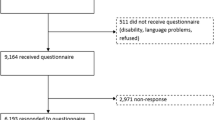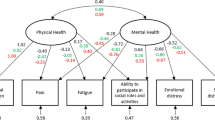Abstract
The sub-scales of the SF-36 in the Dutch National Study are investigated with respect to unidimensionality and reliability. It is argued that these properties deserve separate treatment. For unidimensionality we use a non-parametric model from item response theory, called the Mokken scaling model, and compute the corresponding scalability coefficients. We estimate reliability under the Mokken model, assuming that the items are double homogeneous, and compare it to Cronbach's α. The scalability of the sub-scale general health perceptions is medium (H = 0.46), and for the other sub-scales it is strong (H ≥ 0.6). The reliability in terms of α indicates that all sub-scales can be used in basic research ( > 0.70), but that only physical functioning can be used for clinical applications of quality of life ( > 0.90). The relative merits of our approach are discussed.
Similar content being viewed by others

References
McDonald RP. The dimensionality of tests and items. Brit J Math Stat Psychol 1981; 34: 100–117.
Lord FM, Novick MR. Statistical Theories of Mental Test Scores. Reading, Massachusetts: Addison-Wesley, 1968.
Hattie J. Methodology review: Assessing unidimensionality of tests and items. Appl Psych Meas 1985; 9: 139–164.
Novick MR, Lewis C. Coefficient a and the reliability of composite measurements. Psychometrika 1967; 32: 1–13.
Cronbach LJ. Coefficient ? and the internal structure of tests. Psychometrika 1951; 16: 297–334.
Green SB, Lissitz RW, Mulaik SA. Limitations of coefficient ? as an index of test unidimensionality. Educ Psychol Meas 1977; 37: 827–838.
Hambleton RK, Swaminathan H, Rogers HJ. Fundamental of Item Response Theory. Newbury Park: Sage, 1991.
McDonald RP, Ahlawat KS. Difficulty factors in binary data. Brit J Math Stat Psychol 1974; 27: 82–99.
Glas CAW, Verhelst ND. Testing the Rasch model. In: Fischer GH, Molenaar, IW (eds), Rasch Models, Berlin: Springer Verlag, 1995; 69–95.
Glas CAW, Verhelst ND. Tests of fit for polytomous Rasch models. In: Fischer GH, Molenaar IW (eds), Rasch Models, Berlin: Springer Verlag, 1995; 325–352.
Raczek AE, Ware JE, Bjorner JB, etal. Comparison of Rasch and summated rating scales constructed from SF-36 physical functioning items in seven countries: Results from the IQOLA Project. International Quality of Life Assessment. J Clin Epidemiol 1998; 51(11): 1203–1214.
Jenkinson C, Fitzpatrick R, Garratt A, Peto V, Stewart-Brown S. Can item response theory reduce patient burden when measuring health status in neurological disorders? Results from Rasch analysis of the SF-36 physical functioning scale (PF-10). J Neurol Neurosur Psychiat 2001; 71(2): 220–224.
Mokken RJ. Theory and Procedure of Scale Analysis. Den Haag: Mouton; Berlin: De Gruijter, 1971.
Mokken RJ. Nonparametric models for dichotomous responses. In: van der Linden WJ, Hambleton RK (eds), Handbook of Modern Item Response Theory, New York: Springer; 1997; 351–367.
Aaronson NK, Muller M, Cohen PDA, etal. Translation, validation and norming of the Dutch language version of the SF-36 health survey in community and Chronic disease populations. J Clin Epidemiol 1998; 51: 1055–1068.
Sijtsma K. Methodology review: Nonparametric IRT approaches to the analysis of dichotomous item scores. Appl Psychol Meas 1998; 22: 3–31.
Molenaar IW. Nonparametric models for polytomous responses. In: van der Linden WJ, Hambleton RK (eds), Handbook of Modern Item Response Theory, New York: Springer, 1997; 369–380.
Mokken RJ, Lewis C. A nonparametric approach to the analysis of dichotomous item responses. Appl Psychol Meas 1982; 6: 417–430.
Molenaar IW, Debets P, Sijtsma K, Hemker BT. MSP: A Program for Mokken Scale Analysis for Polytomous Items. Version 3.0. Groningen: iecProGAM-MA, 1994.
Meijer RR, Sijtsma K, Molenaar IW. Reliability estimation for single dichotomous tems based on Mokken's IRT model. Appl Psychol Meas 1995; 14: 283–298.
Nunnally JC, Bernstein IH. Psychometric Theory. 3rd ed. New York: McGraw Hill, 1994.
Bland JM, Altman DG. Cronbach's a (Statistics notes). BritMed J 1997; 314: 572.
Stout W. A nonparametric approach for assessing latent trait unidimensionality. Psychometrika 1987; 52: 589–617.
Stout W, Goodwin Froelich A, Gao F. Using resampling methods to produce an improved DIMTEST procedure. In: Boomsma A, Van Duijn MAJ, Snijders TAB (eds), Essays of Item Response Theory, Berlin: Springer Verlag, 2001; 357–375.
Rost J. The growing family of Rasch models. In: Boomsma A, Van Duijn MAJ, Snijders TAB (eds), Essays of Item Response Theory, Berlin: Springer Verlag, 2001; 25–37.
Sijtsma K, van der Ark LA. Progress in NIRT analysis of polytomous item scores: Dilemmas and practical solutions. In: Boomsma A, Van Duijn MAJ, Snijders TAB (eds), Essays of Item Response Theory, Berlin: Springer Verlag, 2001; 297–318.
Author information
Authors and Affiliations
Rights and permissions
About this article
Cite this article
van der Heijden, P., van Buuren, S., Fekkes, M. et al. Unidimensionality and reliability under Mokken scaling of the Dutch language version of the SF-36. Qual Life Res 12, 189–198 (2003). https://doi.org/10.1023/A:1022269315437
Issue Date:
DOI: https://doi.org/10.1023/A:1022269315437



